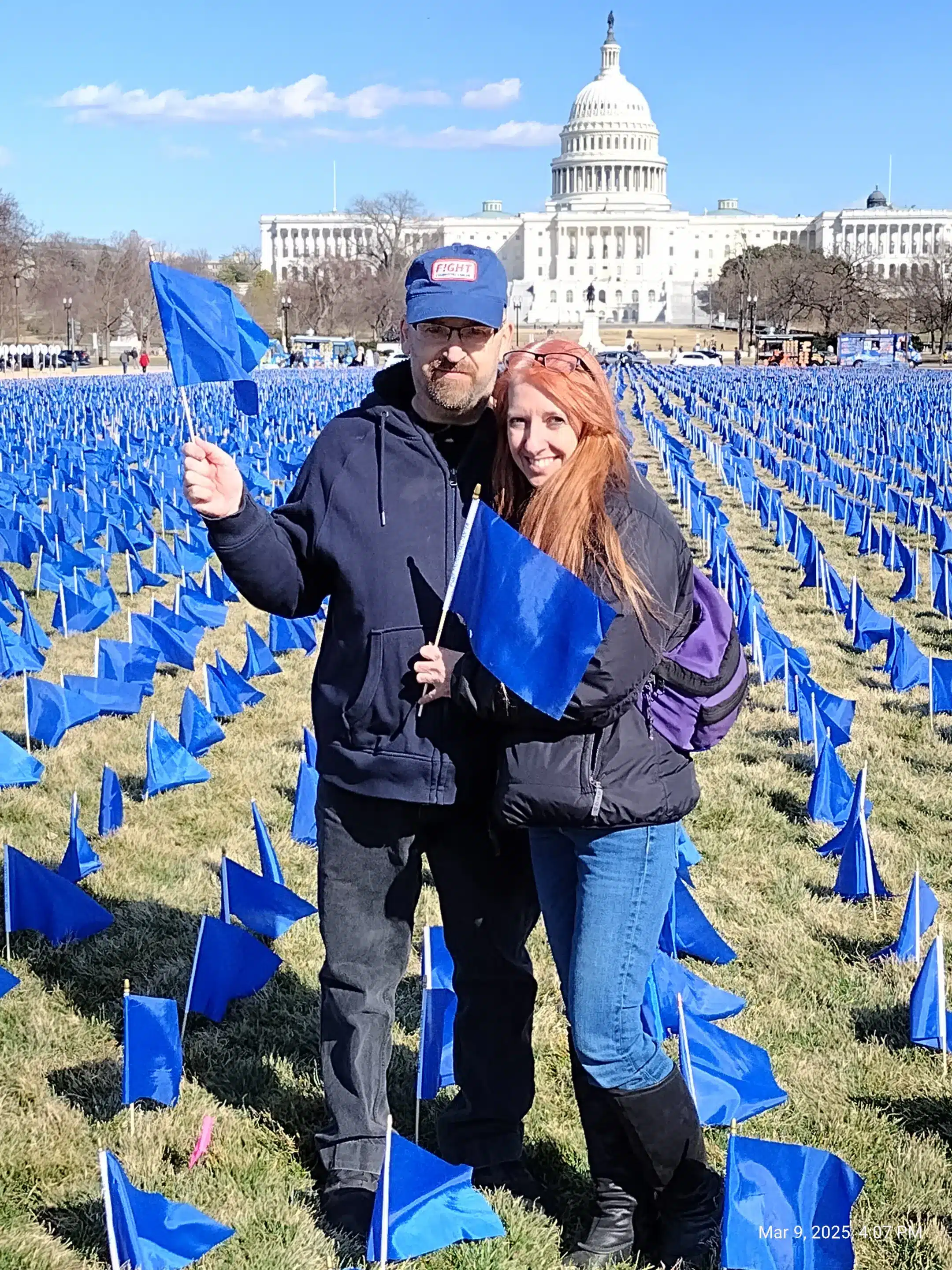Kimberly Schoolcraft of Springfield and Steve Franklin of Westfield in front of the U.S. Capitol in the flag installation.
Reminder Publishing submitted photo
March was another successful month for the advocacy efforts of twins Kimberly Schoolcraft of Springfield and Karen Fogarty of Westfield. Between state proclamations and a trip to Washington, D.C., the two continued their mission of raising awareness for colorectal cancer.
Colon cancer has impacted the family directly as a number of years ago, Schoolcraft lost her partner Andy to colon cancer. This sparked the twins’ advocacy mission and since then, through their volunteer work, they have made, and lost, numerous friends to the disease. Often due to the fact that the disease is unexpected for such young people to be diagnosed.
Schoolcraft said Andy was 47 when diagnosed and had been a “picture of health” as he was active in the gym and outdoors. At that time, the suggested screening age for colorectal cancer was 50.
Not long after his battle with the disease came to an end, Schoolcraft had already begun learning more about the disease and how she could find a way to help. This is when she discovered Fight Colorectal Cancer, or Fight CRC. Fight CRC is a leading patient empowerment and advocacy organization in the U.S., providing balanced and objective information on colon and rectal cancer research, treatment and policy.
With Andy’s death as a motivation, Schoolcraft and her sister joined the team and have since been advocating for advancing research and treatments for what is a top five most common cancer in the U.S.
“My sister, she’s just been the rock of support through all of this,” Schoolcraft said.
Schoolcraft said the time spent through this advocacy work has opened up her eyes that there are many other such cases like Andy’s and that her efforts with Fight CRC will hopefully lead to a better awareness from the public of the disease.
“It started out with Andy but since then I’ve met so many people. When I became part of the research advocacy team, my biggest fear was I would find some treatment option that we hadn’t found in time and I very quickly changed my perspective to, boy, I wish something was out there because now there were all these other people I was becoming fast friends with and seeing them go through their struggles and wishing there was more out there for resources,” Schoolcraft said.
Through her work with Fight CRC, the group has been able to expand awareness through communication and resources on the disease and even got the official recommended screening age moved from 50 to 45 years old.
“That’s really why we’re seeing it in younger people. Overall colorectal cancer incidents are increasing. However, in older populations it’s actually decreasing and that’s due to screenings. And we were instrumental in getting screening down to 45 years old instead of starting at 50. But this is definitely one of those diseases we don’t always see symptoms, or symptoms are easy to ignore,” Schoolcraft explained. “Especially with so many things about different digestive issues it’s easy to ignore symptoms. We all get busy too so if you do have symptoms, it’s easy to write it off but it’s also one of those diseases that presents without any type symptoms and that’s why the screening piece is so important.”
The twins were recognized through a proclamation naming March as Colorectal Cancer Awareness Month from Gov. Maura Healey’s office.
“Colorectal cancer is the second leading cause of cancer deaths in the United States among men and women combined,” said Schoolcraft. “There is currently no cure, but many people don’t realize that it’s largely preventable.”
The proclamation wasn’t the only recent positive news of the twin’s advocacy as last month Schoolcraft and her boyfriend Steve Franklin, of Westfield, went to Washington, D.C., with Fight CRC, for their annual Call-on-Congress.
Call on Congress this year saw over 300 people visiting with Fight CRC. Now in its 20th year, Fight CRC’s first trip to D.C. about two decades ago featured just a handful of people, showcasing how it has grown over the years.
They met with congressional offices to ask for more funding for research and for more awareness through creation of a colorectal cancer caucus in the House of Representatives. The sisters are mentors for the New England region for others who attend Call-on-Congress.
Schoolcraft said the trip was another great experience and opportunity to learn and network with people from all over the country.
“One of the things that we’ve been trying to get is to create a research program within the Department of Defense. There is money there under a peer review program, but we are trying to get money specifically dedicated din the congressional directed medical research program so that it would be specific to colon cancer,” Schoolcraft said. “We’re the only one of the top five cancer killers that doesn’t have our own program.”
She added the trip to D.C. also serves as a reminder of how challenging it can be to get things to the finish line and accomplished through these processes.
“You just have to be persistent. There are so many competing priorities with congress,” Schoolcraft said. “I think having us all there together is helpful because those of us who have been doing it for a while can explain the process and the camaraderie is just great. We end up making a lot of friends and resources and people who understand the situation that you can rely on.”
During their trip to the nation’s capital, Schoolcraft and Franklin also helped plant 20,700 flags in front of the U.S. Capitol. The number of flags represents the number of people aged 20-49 who will be diagnosed in 2030 with colorectal cancer.
“It’s a great bonding experience. We’ve done it in rain, sleet, this year we were lucky it was sunny. It’s nice to be able to go into their offices and say, just look out the window [to see the flags],” Schoolcraft said. “I think it’s a really good visual. It’s a really pretty installation, it’s impactful, but if you look at each of those flags and see a person’s face. Each one of those is a person that we’re trying to help and that exponentially moves out to that also impacts families and friends and people who aren’t in the installation, so it’s definitely an impactful couple of days.”
“In 2030, it’s estimated to be the number one cancer killer in that age group,” added Franklin.
Fogarty was unable to join her sister in D.C., but she and her husband planted flags in their front yard, along with displaying yard signs to bring awareness to the cause.
The family urges the public to educate themselves on their family health history, to not ignore symptoms that don’t feel right no matter your age, and to stay on top of medical screenings. Colorectal cancer screening is recommended to start at age 45. Learn more at FightCRC.org.
“I think the takeaway is really just to stay on top of your medical screenings. I mean all of them obviously, but specifically the colorectal cancer screenings, especially with the age being dropped down to 45,” Schoolcraft said. “All of these people that we’ve met they really inspire us to do more and try to get the word out more. We’ve had patients doing a lot of this work too and they show up on chemo, fighting side effects, and for those of us who can do it without having to go through all of that too, I think it’s just great. The more we can get the word out the better. It’s an inspiring group of people and we’re just trying to help one person at a time.”


